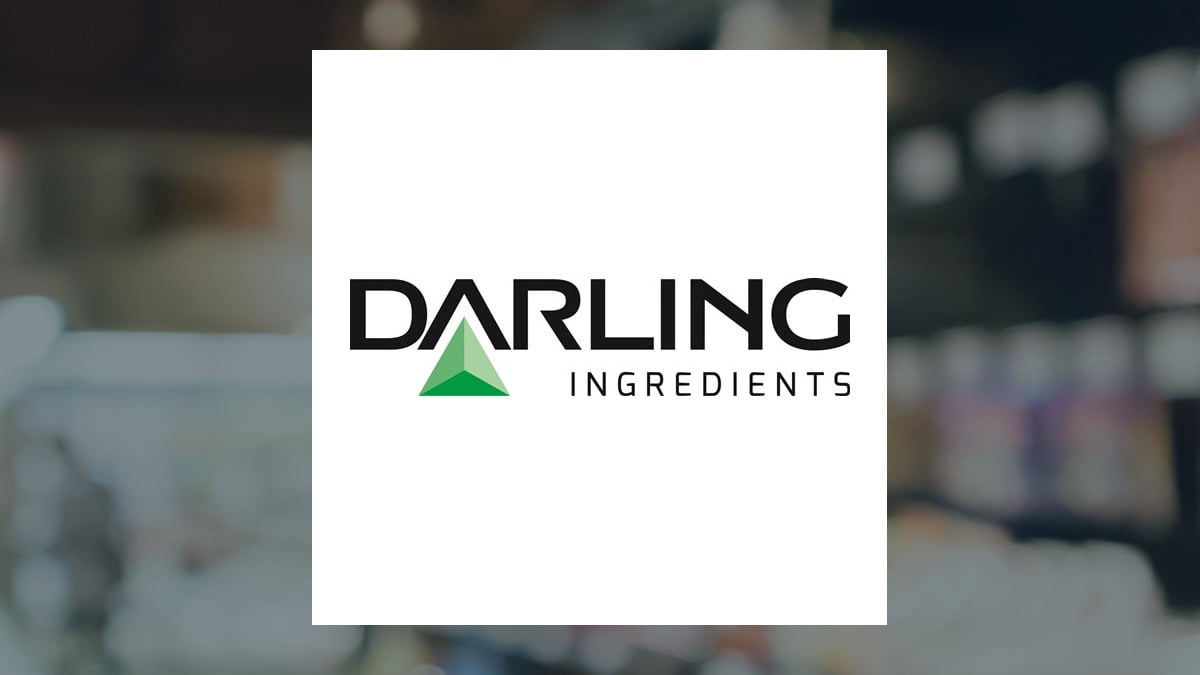
Darling Ingredients, Mercer International, and Richardson Electronics are the three Green Energy stocks to watch today, according to MarketBeat’s stock screener tool. Green energy stocks are shares of companies that develop technologies and services centered on renewable energy sources, such as solar, wind, geothermal, and hydroelectric power, to produce sustainable energy solutions. These stocks often attract investors seeking to support environmentally responsible growth while potentially benefiting from the global shift away from fossil fuels. These companies had the highest dollar trading volume of any Green Energy stocks within the last several days.
Darling Ingredients (DAR)
Darling Ingredients Inc. develops, produces, and sells natural ingredients from edible and inedible bio-nutrients in North America, Europe, China, South America, and internationally. The company operates through three segments: Feed Ingredients, Food Ingredients, and Fuel Ingredients. It offers ingredients and customized specialty solutions for customers in the pharmaceutical, food, pet food, feed, industrial, fuel, bioenergy, and fertilizer industries.
DAR traded up $0.50 on Monday, hitting $39.72. 777,210 shares of the company were exchanged, compared to its average volume of 2,157,503. The company has a debt-to-equity ratio of 0.89, a quick ratio of 0.83 and a current ratio of 1.41. The firm has a fifty day simple moving average of $36.21 and a two-hundred day simple moving average of $37.64. The stock has a market capitalization of $6.32 billion, a PE ratio of 22.92 and a beta of 1.21. Darling Ingredients has a 12 month low of $32.55 and a 12 month high of $48.39.
Read Our Latest Research Report on DAR
Mercer International (MERC)
Mercer International Inc., together with its subsidiaries, manufactures and sells northern bleached softwood kraft (NBSK) and northern bleached hardwood kraft (NBHK) pulp worldwide. The company operates through two segments, Pulp and Solid Wood. It manufactures, sells, and distributes pulp, electricity, and chemicals through pulp mills.
Shares of NASDAQ:MERC traded up $0.34 during trading on Monday, reaching $8.03. 420,286 shares of the company traded hands, compared to its average volume of 270,229. The company has a current ratio of 3.79, a quick ratio of 2.39 and a debt-to-equity ratio of 3.09. Mercer International has a 52-week low of $5.33 and a 52-week high of $11.20. The firm has a market capitalization of $536.64 million, a price-to-earnings ratio of -6.24 and a beta of 1.29. The business’s fifty day moving average is $6.54 and its 200-day moving average is $6.47.
Read Our Latest Research Report on MERC
Richardson Electronics (RELL)
Richardson Electronics, Ltd. engages in the provision of engineered solutions, power grid and microwave tube, and related consumables worldwide. The Power and Microwave Technologies segment manufactures electron tubes and radio frequency (RF), microwave and power components used in semiconductor manufacturing equipment, RF, and wireless and industrial power applications, as well as various applications including broadcast transmission, CO2 laser cutting, diagnostic imaging, dielectric and induction heating, energy transfer, high voltage switching, plasma, power conversion, radar, and radiation oncology.
RELL traded up $0.03 during trading on Monday, hitting $13.05. 29,907 shares of the stock traded hands, compared to its average volume of 60,426. The firm has a market capitalization of $188.04 million, a P/E ratio of 435.15, a price-to-earnings-growth ratio of 1.98 and a beta of 0.93. Richardson Electronics has a 12-month low of $8.08 and a 12-month high of $15.51. The firm has a 50-day moving average of $13.52 and a 200 day moving average of $13.16.
Read Our Latest Research Report on RELL
Featured Articles
- MarketBeat’s Top Five Stocks to Own in February 2025
- Price Targets on NVIDIA Rise in Front of Earnings
- Archer Aviation Stock Skids: Mistaking Progress for Bad News?
- 3 Beaten Down Healthcare Stocks Recovering in 2025
- These 3 Unusual ETFs Have Dominated the S&P 500’s Performance YTD
- UnitedHealth’s RSI Suggests It Is Extremely Oversold
